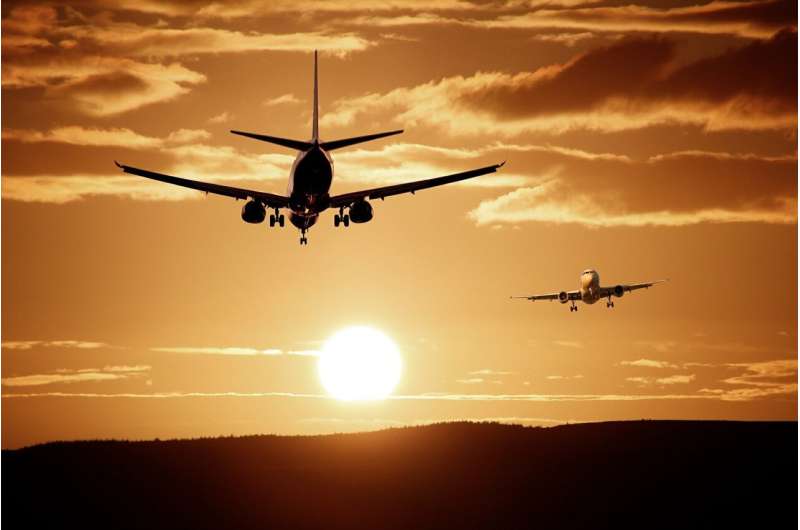Home » Health News »
FACT FOCUS: Masks help curb spread of COVID-19 on planes

The CEO of a major airline suggested during a congressional hearing this week that face masks provide little value on planes—a claim that was quickly amplified online.
Citing high-quality filtration systems aboard planes, Southwest Airlines CEO Gary Kelly stated that “masks don’t add much, if anything, in the air cabin environment.”
But experts strongly disagree. Here are the facts.
CLAIM: Mask-wearing on planes is unnecessary because advanced air filtration systems sufficiently reduce the risk of COVID-19 transmission.
THE FACTS: While it’s true that the common air filtration and distribution systems used in modern aircraft are highly effective at reducing the risk of COVID-19 transmission among passengers, masks add another layer of protection for air travelers, experts told The Associated Press.
Kelly’s comments came during a Wednesday hearing before the Senate Committee on Commerce, Science, and Transportation. After returning home from the hearing, Kelly tested positive for COVID-19, a Southwest spokesperson confirmed to the AP on Friday.
Kelly made his comment about masks in response to a question from Sen. Roger Wicker, a Republican representing Mississippi, who asked Kelly and another airline CEO if they thought air travel without masks could ever resume.
Kelly said that “99.97% of airborne pathogens are captured” by high efficiency particulate air filters, or HEPA filters, on airplanes, before suggesting that masks are unnecessary during air travel.
“Yeah, I think the case is very strong that masks don’t add much, if anything, in the air cabin environment,” Kelly said. “It’s very safe, and very high quality compared to any other indoor setting.”
American Airlines CEO Doug Parker appeared to agree, saying, “I concur, the aircraft is the safest place you can be.” He noted that all of his company’s aircraft have the same HEPA filters.
The comments were quickly picked up by news outlets and blogs, and spread on social media.
“The CEOs of Southwest and American Airlines both said today in Senate testimony that masks on planes serve no purpose,” said one tweet shared more than 3,500 times.
Both CEOs clarified their comments to say they support the current federal policy requiring masks on flights. On Friday, after returning home from the hearing, Kelly tested positive for COVID-19, Southwest spokesperson confirmed to the AP.
Southwest Airlines provided the AP with a message that Kelly sent to employees in which the CEO apologized for any “confusion” stemming from the hearing, saying Southwest continued to “support the current federal mask mandate at airports and on airplanes.”
Kelly said the airline adopted a mask requirement aboard its flights in May 2020, before the federal government required it, and that employees and customers “have felt it has been an important layer of protection, and I certainly agree with that.” He said the airline would “continue to rely on the advice of our medical experts regarding the necessity of masks.”
Parker later said on social media he “agreed with my fellow CEOs that being onboard a plane is proven to be a safe and healthy indoor environment.” But he said that his statement at the hearing was unclear and that he supported the federal mask mandate “Full stop.”
While HEPA filtration systems are highly effective at reducing the transmission of viruses, they do not completely eliminate risk aboard flights, according to Linsey Marr, an aerosol scientist at Virginia Tech.
“The issue is that they only work on the air as it passes through the filter,” she said in an email. “If you are sitting near someone who is releasing lots of viruses into the air, you could end up inhaling them before they have had a chance to pass through the filtration system.”
Marr said it takes a few minutes for air to completely pass through the filtration system. She said requiring everyone to wear a mask reduces the amount of virus an infected individual can release into the air, and helps reduce the amount of virus someone wearing a mask might breathe in.
Leonard J. Marcus, director of the Aviation Public Health Initiative at Harvard University, agreed.
“Yes, the ventilation system on airplanes are incredible. They’re comparable with what you might find in an operating room,” he said. But “it is the multiple layers, it’s not one thing alone.”
Marcus said that masks are particularly important when people are boarding and exiting airplanes or moving around the aircraft cabin. Rising COVID-19 cases and the threat posed by the omicron variant also make mask-wearing on planes essential, he said.
“People are moving about, people are turning to speak to someone, people are sometimes lifting up their mask to drink,” said Marcus, whose initiative published a report in October that supported a “layered” approach to lowering risk. “If everyone is wearing the mask, there’s going to be much less transmission of the disease.”
Source: Read Full Article



